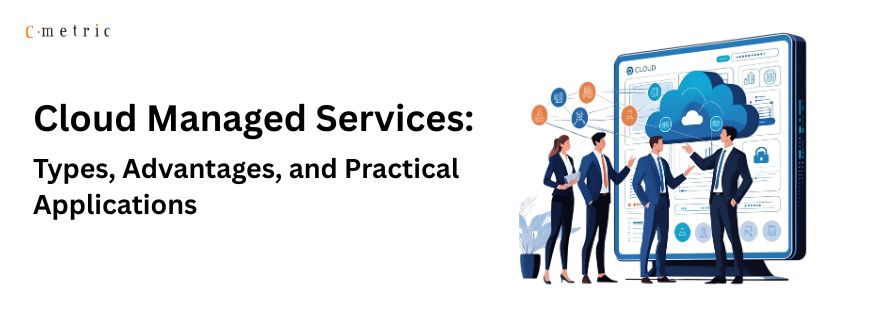Introduction
In the fast-moving digital world we live in today, cloud managed services allow businesses to run operations, grow without trouble, and remain competitive. Companies that outsource tasks like security, infrastructure, and compliance gain access to skilled help and top-notch tools letting them concentrate on growing. In this blog, we will look into the different types, advantages, and examples of cloud managed services, and explain why they are a key part of success for businesses today.
Different Types of Cloud Managed Services
Cloud managed services offer a variety of options to support different business needs. Knowing the various types helps businesses find the best fit for what they need. Below are some main types of it to consider.
- Infrastructure Management: This service handles cloud infrastructure like servers, storage, and networking. It keeps the cloud environment safe, adaptable, and effective. Businesses can then focus on what they do best without dealing with the technical side of the infrastructure.
- Application Management: Managed service providers take care of application management through tasks like deploying keeping an eye on, and maintaining software applications. This helps make sure the apps run well and get updated with the newest features and fixes.
- Security and Compliance: Cyber threats keep growing making it essential to use security and compliance services to safeguard important data and follow regulations. These services handle threat detection, incident responses, and audits to help businesses stay secure and stress-free.
- Data Management: Handling data well is key to running any company. Cloud services in this area cover backups, recovery from disasters, and analyzing data. This helps companies decide using up-to-date information.
- Network Management: A strong and dependable network is vital to keep communication smooth and data flowing. Network services include keeping an eye on systems fixing problems, and finding ways to improve network performance.
When businesses learn about these types of cloud-managed services, they can figure out which parts of their operations might gain the most by outsourcing. This approach can make their work more efficient and help them save money.
Main Advantages of Cloud-Managed Services
Using cloud-managed services offers many advantages changing the way organizations work and stay competitive in their industries. Below are some of the most important benefits companies may notice:
- Cost Efficiency: Companies can lower expenses by hiring outside help to manage IT instead of keeping an internal team. Managed service providers let businesses adjust costs so they pay for the specific services they need to use.
- Expertise and Support: Managed service providers come with deep knowledge and solid technical skills. They give businesses access to modern tools and top practices. This knowledge leads to smoother performance less downtime, and faster problem-solving.
- Enhanced Security: Businesses stay protected from cyber risks with specialized security services offered by cloud-managed providers. These providers rely on advanced tools and strict protocols to keep sensitive data safe and meet industry rules.
- Scalability and Flexibility: Cloud managed services let companies adjust resources as their requirements shift. This ability helps businesses meet market needs without spending on infrastructure.
- Focus on Core Business: Handing over IT tasks to MSPs helps companies focus on their main objectives and strengths. This shift boosts both efficiency and creativity.
These advantages show how cloud managed services play a key role in today’s business plans. They help companies remain competitive and adapt as the world keeps changing.
Examples of Cloud Managed Services
Cloud managed services are bringing change to industries by offering flexible safe, and fresh solutions.
- E-commerce: Helps shops handle sudden demand increases without hiccups and protects customer information with solid security measures.
- Healthcare: Keeps patient records safe, meets HIPAA rules, and uses analytics tools to uncover insights that improve patient care.
- Financial Services: Delivers a secure system built to meet regulations and supports AI-based tools like fraud detection and risk checks.
- Manufacturing: Boosts production workflows, improves supply chain systems, and monitors machines with IoT tech to predict issues before they happen.
These solutions across industries strengthen security, improve efficiency, and spark new ideas, giving companies the tools they need to succeed.
How Cloud Managed Services Boost Business
Cloud-managed services improve how businesses run by simplifying tasks and helping companies work towards their key goals. Here’s how they support better operations:
- Better Teamwork: Companies can use managed network and communication services to connect their teams without worrying about where they are located. This connection boosts work efficiency and helps teams finish projects on time.
- Faster Growth Through Ideas: When businesses hand over everyday IT work to managed service providers, they free up resources to try out new ideas and build strategies. Focusing on these areas helps businesses grow and outpace competitors.
- Staying Ahead with Maintenance: Managed service providers keep an eye on systems and fix small problems before they turn into big ones. This method cuts down on downtime and keeps IT systems running.
- Data-Driven Decision Making: Managed data analytics services help businesses use data to make better decisions. These insights help companies improve how they work, enhance customer interactions, and find new ways to grow.
By introducing these upgrades, cloud-managed services help organizations work better and reach their goals in fast-moving markets.
Picking the Right Cloud Managed Service Provider
- Check expertise and certifications like AWS, Azure, or Google Cloud.
- Make sure they offer a wide range of services like infrastructure, security, and compliance.
- Opt for services that grow with your needs and come with flexible pricing choices.
- Confirm strong security measures and adherence to regulations.
- Focus on providers offering round-the-clock support and a dedicated account manager.
Costs to Consider When Using Cloud Managed Services
Cloud-managed services bring plenty of advantages, but knowing the costs involved is crucial to decide. Below are important things to think about regarding cost:
- Service Pricing Models: MSPs present different ways to price their services, like subscription plans tiered levels, or a pay-as-you-go setup. Review these options to figure out which fits your budget and how you plan to use the service.
- Hidden Costs: Look out for sneaky extra charges. These might include setup costs, fees for data transfers, or payments tied to extra features. Check the service agreement to make sure every potential cost is spelled out.
- Return on Investment (ROI): Think about the ROI you might get by outsourcing your IT management. Compare how much you could save on in-house IT spending to the benefits you gain from better efficiency and smoother performance.
- Cost-Benefit Analysis: To evaluate cloud managed services, perform a detailed cost-benefit analysis. This process helps compare the costs to the advantages and shows if the investment fits your business goals.
When businesses understand these cost factors, they plan budgets better and get more value from their spending on cloud managed services.
Cloud Managed Services: Challenges and How to Solve Them
Cloud managed services bring many benefits, but they can also create issues that businesses must solve. Below are some typical challenges along with ways to handle them:
- Integration Problems: Adding cloud services to current systems might be challenging. Teams should team up with their MSP to ensure smooth setup and avoid major issues.
- Data Safety Worries: Protecting data is a big concern when moving to the cloud. Businesses should work with a trustworthy MSP that focuses on security and uses strong tools to keep private data safe.
- Dependence on One Vendor: Depending too much on just one cloud service provider can cause problems like vendor lock-in. Companies should opt for a provider offering adaptable solutions that work with various cloud platforms.
- Skill Shortages: Missing expertise within your team can limit success with cloud managed services. To fix this, work with an MSP offering training and help to improve your team’s skills.
By tackling these issues, companies can switch to cloud managed services and take full advantage of what they offer.
What’s Next in Cloud Managed Services
The field of cloud managed services keeps changing as AI, machine learning, edge computing multi-cloud strategies, and sustainability reshape it. AI makes predictive analysis and automation possible. Edge computing focuses on real-time IoT processing. More businesses now prefer multi-cloud systems that need easy integration and aim for energy-saving methods to cut carbon emissions.
Wapping Up
In conclusion, outsourcing IT management allows companies to save money, improve security, and access modern tech. Choosing the right service provider brings higher productivity new ideas, and greener growth. Leverage cloud managed services from a trusted cloud application development services provider to stay ahead and prepare for tomorrow.












Get in Touch